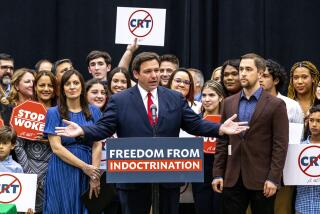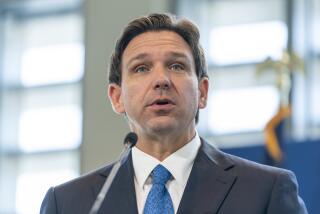Florida OKs Tobacco Racketeering Claims
- Share via
A Florida judge ruled Friday that state attorneys can proceed with racketeering claims in their massive lawsuit against the tobacco industry, a ruling that could enhance the state’s case against cigarette makers and raise the possible damages.
Circuit Court Judge Harold J. Cohen in West Palm Beach held that Florida’s attorneys have stated a viable cause of action under the state’s Racketeer Influenced and Corrupt Organizations (RICO) Act, which is similar to the federal statute of the same name.
Florida is one of 19 states suing the tobacco companies to recoup billions of dollars spent treating people with smoking-related illnesses. Florida’s case is significant in that it is expected to be the first from a large state to go to trial--in August in this instance.
The ruling means that “it’s extremely likely” that other states that have RICO statutes will amend their suits against the tobacco industry by adding RICO counts, said Northeastern University law professor Richard Daynard, who heads the Tobacco Product Liability Project, which encourages suits against the cigarette industry.
California has not filed suit, but San Francisco filed a suit in federal court that contains a federal RICO cause of action; several California counties have joined that complaint.
Friday’s ruling was hailed by Florida’s Deputy Atty. Gen. Jim Peters, who said it enhances the state’s prospects in the case and means that if the state prevails, the damage award could be tripled. When the suit was filed in 1995, the state asked for $1 billion in damages. The ruling also gives Florida “a broader net” as to the type of evidence that can be presented in the case, said Ronald L. Motley, one of Florida’s outside counsel.
But Philip Morris attorney Gregory G. Little countered that Cohen’s ruling merely means that Florida is allowed to pursue civil RICO allegations, not that they are proven.
Florida added the RICO claims in November, after Cohen dismissed 15 of the original 18 counts in Florida’s suit.
The gist of the racketeering allegation is that the tobacco industry, for more than 40 years, has engaged in a scheme to defraud the American public and state and federal regulators, said Kim Tucker, one of the Florida attorneys who prepared the RICO claim.
The state asserts that the industry perpetrated this fraud by creating confusion regarding the health risks of smoking and nicotine addiction. By doing that, the industry made its product more valuable because the companies were able to continue marketing cigarettes, free of regulation by federal authorities, the suit contends.
Moreover, the suit alleges that as a consequence, the tobacco industry shifted the burden of health-care costs it was responsible for to other parties. To buttress this contention, Florida attached a recently obtained 1978 internal memo by Philip Morris executive Robert B. Seligman, in which he warned company executives about rising health-care costs and their potential impact on the industry:
“Health-care costs are rising at an alarming rate: $42 billion in 1966. $162 billion in 1977. $310 billion in 1988 (anticipated).”
“More industry antagonists are using an economic argument against cigarettes: i.e. cigarettes cause disease; disease requires treatment; major health costs are borne by the government; the taxpayers pay in the end.
“Thus, as health costs rise astronomically, the opposition becomes armed with more potent weapons. We must be prepared to counter this line of argument.”
More to Read
Sign up for Essential California
The most important California stories and recommendations in your inbox every morning.
You may occasionally receive promotional content from the Los Angeles Times.










